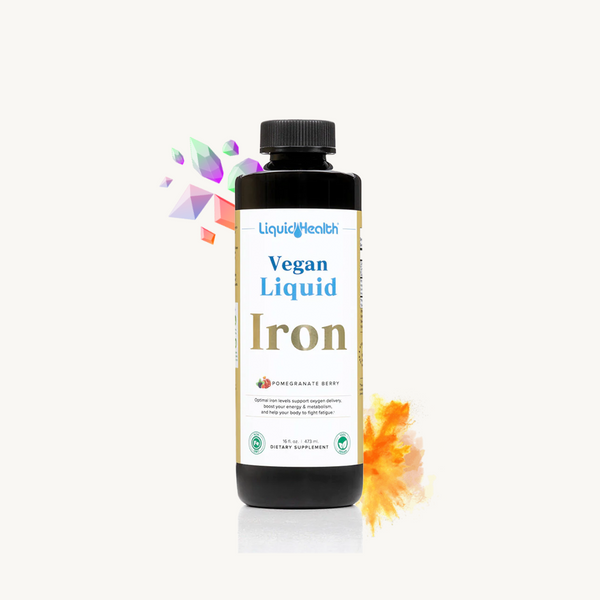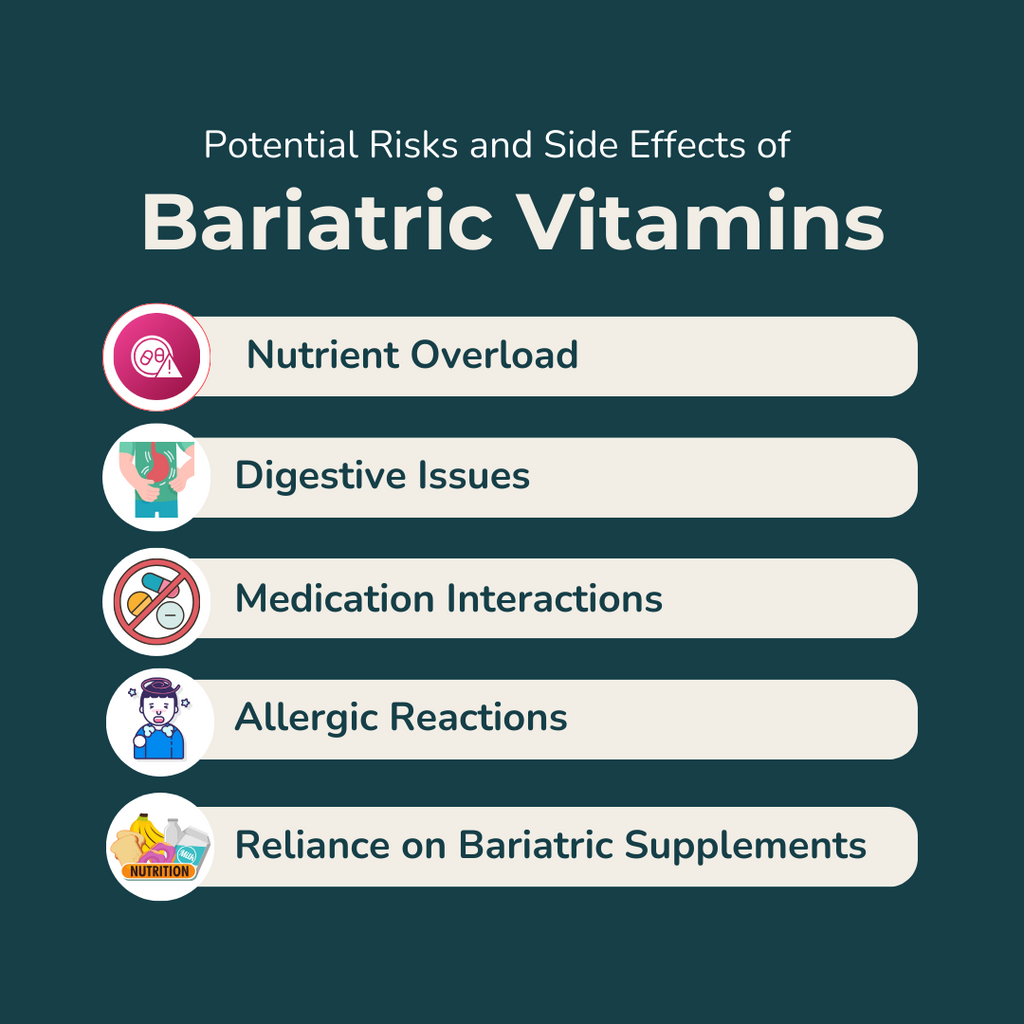
An Essential Guide to Bariatric Vitamins Types
Weight loss surgery alters the digestive tract significantly, affecting the body's ability to absorb essential nutrients. As a result, after undergoing bariatric surgery, you could be at high risk of malnutrition. That's where bariatric vitamins come in.
Bariatric vitamins are designed to ensure the body gets the essential nutrients it requires post-bariatric surgery, preventing nutritional deficiencies. However, with numerous bariatric vitamins available, how do you know which ones are right for you?
In this guide, we'll explore all the essential things you need to know about bariatric vitamins. We'll explore their various types, the crucial factors to consider when choosing bariatric supplements, their potential side effects, and more to help you make an informed decision on the right bariatric vitamins for your needs.
Types of Bariatric Vitamins
Bariatric vitamins aren't created equal. There are several types of bariatric vitamins, each with unique features. Here are the common types of bariatric vitamins:
Bariatric Multivitamins
Bariatric multivitamins take an all-in-one approach to addressing nutritional deficiencies. They contain a variety of vitamins and minerals, such as vitamin B12, vitamin D, calcium, iron, and folic acid, among other nutrients. Many multivitamins come in chewable or liquid forms for easier absorption during the early stages of recovery.

Our Complete Multiple Liquid formula contains a rich blend of nutrients, including B vitamins, vitamins A, C, E, and minerals like zinc, calcium, and magnesium, making it ideal for post-surgery patients looking for a comprehensive supplement to address nutritional deficiencies.
Stand-Alone Bariatric Vitamins
While multivitamins are an excellent way to get all the essential nutrients you need post-bariatric surgery, you might require additional support for specific nutrients. That's where stand-alone bariatric vitamins come in. These supplements are designed to address specific nutritional deficiencies. Common stand-alone options include:


Specialized Formulas
Depending on your specific surgery and individual needs, your doctor or dietician might recommend specialized formulas. For example, gastric bypass surgery significantly impacts the absorption of iron, folic acid, and vitamin B12.
As a result, after undergoing gastric bypass surgery, your healthcare provider might recommend taking a specialized bariatric support formula rich in these nutrients.
Choosing the Right Bariatric Vitamin Supplement

With numerous bariatric vitamins on the shelves, selecting the right one can feel daunting. Uncertain which one is suitable for you? Here are key factors to consider when choosing a bariatric vitamin:
Healthcare Provider's Recommendations
Follow your doctor or dietician's recommendations when choosing a bariatric vitamin. These professionals understand your surgery type, individual needs, medical history, and potential absorption challenges, so they will tailor your vitamin regimen accordingly.
Nutrient Composition
Look for bariatric vitamins containing the essential vitamins you require post-surgery, like iron, folic acid, calcium, vitamin B12, and vitamin D, in doses aligned with your healthcare provider's guidance. Avoid formulas with additives like sugar, binders, and artificial flavors. Instead, opt for cleaner options, as additives can affect nutrient absorption.
Form
Most post-surgery patients find it challenging to swallow capsules and tablets. Choose chewable or liquid formulas as they are easier to swallow.
Absorption
Not all bariatric vitamins are created equal. Post-surgery, you might want to opt for liquid or chewable options as they are better absorbed than pills.
Also, look for formulas with complementary ingredients that enhance absorption. For example, vitamin D enhances calcium absorption, so you might want to look for a formula that includes both nutrients.
Our Calcium & Magnesium formula is available in a delicious juicy orange and vanilla formula and contains a rich blend of calcium, vitamin D, magnesium, manganese, and boron, which are essential for healthy bones.
Quality and Safety
Choose bariatric vitamins from reputable brands or those your healthcare provider recommends. To assess a brand's quality and safety, check out reviews about it online. If it has many negative reviews, you might want to avoid it.
Personal Preferences
Taste and texture matter. Choose a supplement with a pleasant taste you enjoy taking consistently. If you struggle with swallowing bitter pills, look for a liquid formula that's easier to swallow and palatable.
Price and Value
Bariatric vitamins vary in cost. Find a balance between affordability and quality, bearing in mind inexpensive options might not offer the same level of absorption or purity.
Potential Risks and Side Effects of Bariatric Vitamins

While bariatric vitamins are essential for your post-surgery health, they may have some risks and side effects. Common risks and side effects of bariatric vitamins include:
Nutrient Overload
Exceeding recommended dosages can be harmful. Adhere to your healthcare provider's prescribed amounts and avoid taking multiple supplements with overlapping ingredients. High doses of certain nutrients, like iron, can lead to toxicity and health complications like inflammation of the stomach lining, ulcers, and reduced zinc absorption.
Digestive Issues
Some individuals may experience gastrointestinal issues like constipation, diarrhea, or nausea when they start taking bariatric vitamins. If you experience digestive issues, consult your healthcare provider to determine whether to adjust your regimen or use an alternative supplement.
Medication Interactions
Certain bariatric vitamins may interact with your medications, impacting their efficacy or causing severe reactions. Always disclose all medications and supplements you're taking to your physician to avoid potential interactions.
Allergic Reactions
Although rare, some individuals experience severe allergic reactions to certain ingredients in bariatric vitamins. For example, some supplements contain gelatin, which can cause adverse allergic reactions.
Be mindful of any allergic reactions after starting a new supplement regimen, and consult your doctor immediately if you experience allergic reactions like rashes, nausea, or breathing difficulties.
Reliance on Bariatric Supplements
Bariatric supplements should complement, not replace, a well-balanced diet. Prioritize taking nutrient-rich meals to maximize your body's ability to naturally absorb essential vitamins and minerals.
Integrating Bariatric Vitamins Into Daily Life
Taking your bariatric vitamins is crucial to staying on track with your weight management goal and overall well-being. However, adhering to a vitamin regimen isn't easy. Here are some tips to seamlessly integrate your vitamins into your daily routine:
Use Technology
Use phone reminders, pill organizers with alarms, or apps that track your vitamin intake. Technology can be a key ally in helping you stay on track with your vitamin regimen.
Establish Your Rhythm
Identify what works best for you. Whether it's with breakfast, before bed, or alongside your medication, choose a consistent time you're unlikely to forget. That said, it's advisable to take your bariatric vitamins with or after meals to minimize the risk of side effects like nausea.
Embrace Convenience
Keep your bariatric vitamins readily accessible. Place them on your nightstand, purse, or kitchen countertop where they're easily visible. Consider using a pill organizer for daily or weekly doses, especially if you take multiple supplements.
Conclusion
Bariatric vitamins are critical to your well-being post-surgery. After undergoing weight loss surgery, your body might struggle to absorb certain nutrients, which makes supplementation crucial.
At Liquid Health, we offer a variety of high-quality, safe, and effective supplements. And best of all? All our formulas come in liquid form, so they're easy to swallow and rapidly absorbed. Check out our shop for a wide collection of bariatric vitamins.
FAQs
How Long Do I Need to Take Bariatric Vitamins?
In most cases, you'll need to take bariatric vitamins for the rest of your life post-surgery. After surgery, your body's ability to absorb essential nutrients changes, and you may not get all the nutrients you require solely from your diet. Your healthcare provider will determine the specific timeline based on your unique needs and surgery type.
What Are the Most Essential Nutrients Required After Bariatric Surgery?
The key nutrients required after bariatric surgery include iron, calcium, folate, vitamin B12, and vitamin D. Surgery affects the body's ability to absorb these nutrients, making supplementation crucial.
Can I Take Over-the-Counter Vitamins After Bariatric Surgery?
It's generally not recommended to rely solely on over-the-counter vitamins after bariatric surgery. These formulas may not contain the specific types and dosages of nutrients you require, and their absorption might not be optimized. Consult your doctor or dietician before taking any supplements, including over-the-counter options.
What Happens if I Don't Take Bariatric Vitamins Post-Surgery?
Skipping your bariatric vitamins can lead to nutrient deficiencies, which can cause various health complications like fatigue, hair loss, and muscle weakness. In extreme cases, skipping your regimen can lead to adverse health problems like anemia or osteoporosis. Follow your healthcare provider's dosage recommendations to ensure your body gets the nutrients it requires to function optimally.
Can I Take Gummy Vitamins After Bariatric Surgery?
Gummy vitamins are generally not recommended for bariatric patients. They contain high levels of sugar and calories, which can affect your post-surgical diet and compromise your weight loss goals. Additionally, they aren't easily absorbed by the body. Opt for chewable or liquid forms designed specifically for bariatric patients.


Leave a comment